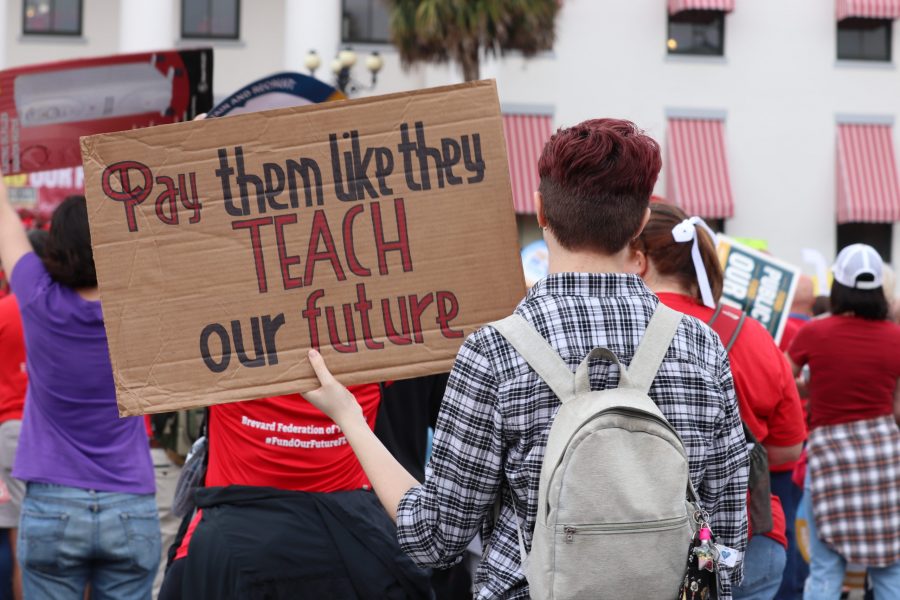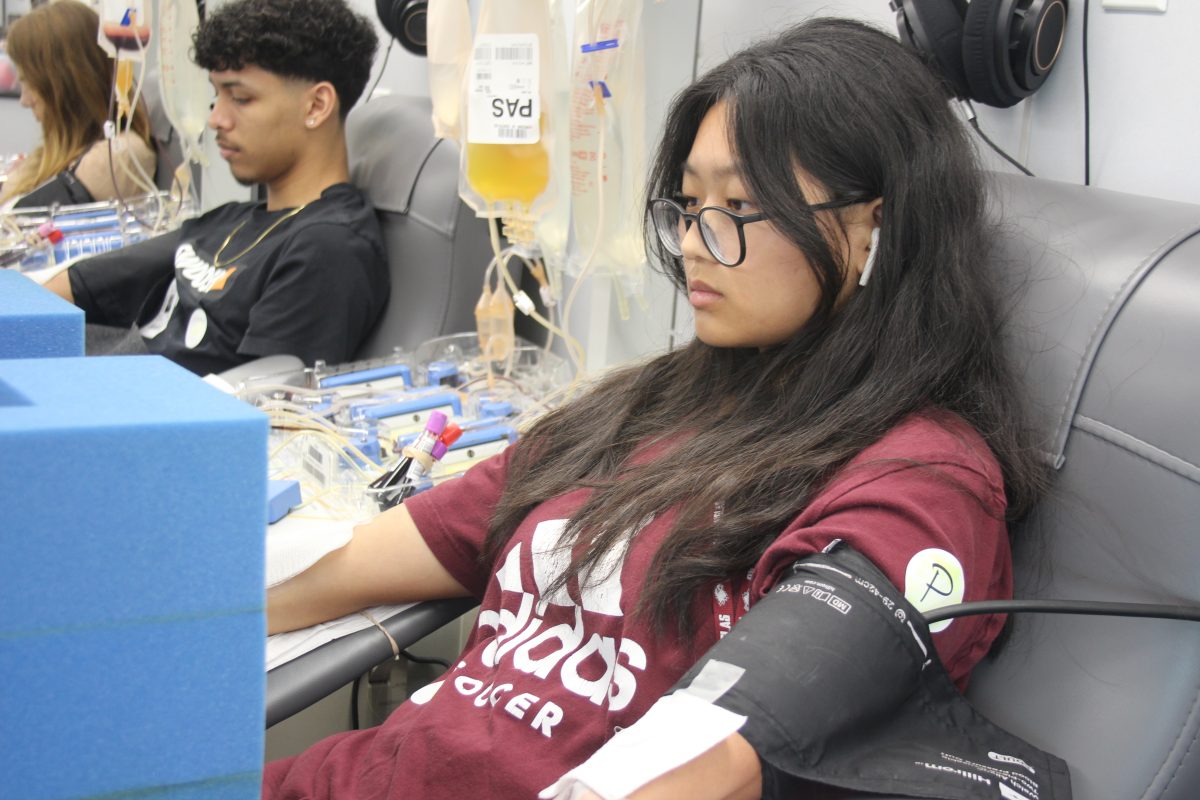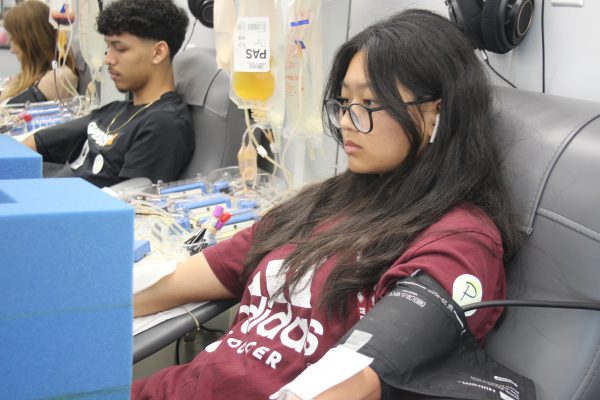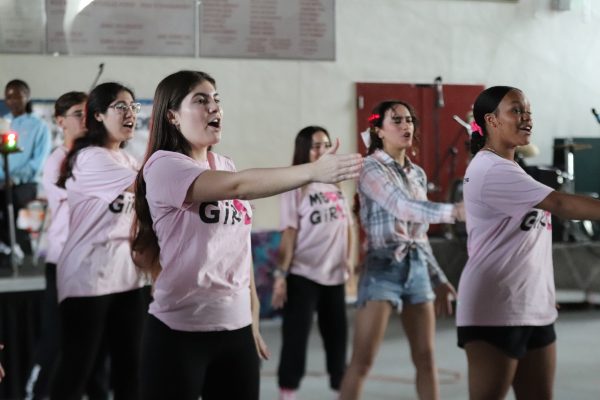2020 legislative session allocates $500 million to increase teacher salaries across Florida
A protester holds up their homemade sign made out of cardboard at the “Fund Our Future” rally in Tallahassee, Florida on Monday, Jan.13.
May 15, 2020
Florida Governor Ron DeSantis had originally sought after a $902 million package to increase minimum pay and supply bonuses, but the outbreak of COVID-19 has affected the state’s spending. With the approximate $500 million set aside for educators, school districts and charter schools are required to use the money to increase the minimum base salary to at least $47,500, or to the maximum amount achievable. The bill passed applies to full-time classroom teachers and certified pre-kindergarten teachers funded in the Florida Education Finance Program.
“We are severely underpaid. While we aren’t the lowest paid in the nation, we are nowhere near where we should be for as much work as we do,” Marjory Stoneman Douglas High School English teacher Coral Bachen said. “I hate to say ‘a raise is a raise’ or ‘at least we’re getting something,’ because, for me, I don’t want to do anything else but teach public school.”
According to the Florida Education Association’s website, the state “has nearly 50,000 education staff professionals who earn a wage below the national poverty level for a family of four.” Florida is ranked 46th out of the 50 states in teacher pay, more than $12,000 behind the national average of about $60,483, a 2017-2018 report by the National Education Association claimed.
“Teachers do everything they can for a student and people need to recognize that. Even with the coronavirus, teachers are taking the extra time to set up video chats and change their lesson plans to be done from home,” senior Madison Diaz said. “Raising their salaries is a step in the right direction. I believe I cannot put a price on everything my teachers taught me and more and more people are realizing that. All I can do right now is hope that one day teachers will be getting the pay they deserve.”
At the start of the 2019-2020 school year, Florida had over 3,500 teacher vacancies, which ultimately led to more than 300,000 students without a full-time, certified teacher in their classroom. Yet, Florida’s shortage of educators is only worsening. Results from a 2018 survey conducted by American College Testing show that only 5% of high school students are interested in becoming a teacher. In the same survey, 63% of students weren’t interested because of the initial salary, while 43% said it did not have much “opportunity for career advancement.”
“I want to be a teacher. I ended up in the teaching academy freshman year. Even though it was one of my alternatives, I ended up loving it,” Hailey Carpenter, Co-President of MSD’s Florida Future Educators of America Club, said. “Teachers get paid during school hours, but what people don’t realize is they work hard outside of school as well, grading and making lesson plans. They do so much and by not being paid properly, it’s like they are not being respected for all their hard work.”
One concern with this budget is that the majority of the money, $400 million, is reserved for new teachers, and that it leaves veteran teachers behind. According to a March 15 article in the Tallahassee Democrat, “the legislative pay plan sets aside $100 million of the increase for counties to boost salaries for experienced instructors and staff.”
“The state froze the scale about a decade ago and stopped giving step increases to teachers, while also lowering the achievable salaries at the top of the scale,” MSD advanced placement government teacher Jeffrey Foster said. “When they stopped, thousands of teachers, including myself, were deprived of those generous and warranted raises that we were supposed to earn after putting in nearly two decades with the school system.”
Florida’s increase in teacher pay has been influenced by numerous teacher groups, such as the Florida Education Association. The 140,000+ member union hosted “Fund Our Future,” a statewide campaign where thousands of educators, students and parents came together to advocate for improved public education on Monday, Jan. 13. The Tallahassee rally sparked national attention and persuaded lawmakers to make an important decision on where to allot funds for Florida’s teachers.
“Right now, a lot of teachers don’t feel very appreciated by our leaders,” MSD English teacher Sarah Howell said. “My family begged me not to be a teacher. They pointed out how hard it would be to pay off my student debt and to save up money. A lot of teachers are living paycheck to paycheck. It’s hard and no one wants to be in a position where they feel like they have low worth and aren’t appreciated.”
House Bill 641 determined funds for the operation of schools. Additionally, it repealed the Florida Best and Brightest Programs, created to attract and retain high academic achieving classroom teachers. Depending on if they fit the requirements, the controversial program awarded eligible teachers with monetary scholarships worth thousands based on their high school SAT score and their annual classroom evaluations.
Many instructors miss certain opportunities to engage their students with their limited resources, like equipment and funds. With the increase in pay for Florida educators, many teachers are thinking about how they’ve seen the first hand effects of low teacher pay in their own classroom and life.
“It’s no secret that the cost of living has been climbing while wages have been mostly unchanged. It’s getting harder to afford everything, and it’s well known that teachers don’t make that much,” MSD physics teacher Carlos Mercado said. “I can tell you this year alone, I have been struggling to have my students do meaningful labs. We just don’t have the equipment. Teaching has its pleasures, but most students will not even consider [it as a career] when they realize the pay is as low as it is.”
Under the proposed budget, almost all instructional staff should see a pay increase in the next year. Since $500 million is now being directly distributed into teacher salaries, lawmakers hope to attract and retain more qualified teachers statewide.
Alyssa’s Law will install silent panic alarms in Florida public schools
Named after MSD student Alyssa Alhadeff, who was killed in the shooting at MSD on Feb. 14, 2018, “Alyssa’s Law” requires the installation of silent panic alarms in every public school building. The bills for the law were House Bill 23 and Senate Bill 70. The statewide panic system will provide an electronic link between schools and law enforcement through the press of a button on a cellphone, which would alert them to life-threatening emergencies around the campus, such as an active shooter.
Two years ago, communications between the school and first responders were unreliable as the shooting unfolded. For instance, video cameras in the school didn’t transmit footage in real-time and radio systems became useless when channels became overloaded.
In Alhadeff’s home state of New Jersey, “Alyssa’s Law” passed on Feb. 6, 2019. The legislation is working its way through committee in New York. It was also introduced by Senator Tony Vargas in Nebraska.
The law will be in effect next school year and allocate $8 million in funding for school districts to use to comply.
Alyssa’s mother, Lori Alhadeff, has been fighting for change ever since Alyssa’s death. She ran and won a seat on the Broward County Public School Board, and founded the organization Make Our Schools Safe.
“After the tragedy, I had to dig deeper than ever to move forward. I soon realized that if a common sense school safety measure had been in place that day, there’s a chance that Alyssa would have survived the tragedy,” Lori Alhadeff said. “Alyssa’s Law was born out of my own pain and devastation, with the hope that an event similar to what transpired at MSD would be averted in the future. This law, now passed in New Jersey and soon to be passed in Florida, requires every school building to be equipped with silent panic buttons directly linked to law enforcement. The faster we can get law enforcement on campus, the more likely we are to save lives. My life changed forever after Feb. 14, 2018. My voice became my power, and it is this mantra that is my new normal. I encourage everyone to find his or her voice and use it for the greater good.”
K-12 Scholarship Programs face controversy amid its LGBTQ+ relations
Throughout a student’s years in the public school system, K-12 scholarship programs are offered depending on the student’s circumstances. Florida House Bill 7067 revises the criteria for the Family Empowerment Scholarship Program, the Florida Tax Credit Scholarship Program and the Hope Scholarship Program. Overall, the bill has changed the requirements for the grants to be given to “students whose household income levels do not exceed a specified amount or who are in foster care or out-of-home.”
Additionally, it now requires a scholarship-funding organization to send students who did not receive a scholarship from them because of lack of funds, to other scholarship groups. It has also established a priority order for the Family Empowerment Scholarship Program and changed the age limit to until high school graduation or age 21 for the Florida Tax Credit Scholarship Program, among other things.
The bill even introduced a dual enrollment full-time equivalent that would award bonuses for individual college program students with an “A” in their core course or a 3.0 average after completion of an associates degree through dual enrollment.
On the other hand, the programs are very controversial. One of the arguments is that the scholarships allow institutions who accept the money to discriminate against LGBTQ+ students and in some cases, the children of gay and lesbian couples. Some of the participating private schools in the tax-credit scholarship programs have policies that discriminate LGBTQ+ students, prompting businesses that publicly supported the community’s rights to possibly withdraw their support from the scholarship programs.
“Preventing LGBTQ youth of the children of LGBTQ folks is a violation of those people’s civil liberties, and if someone wants to spend scholarship or voucher money, they should have to do so at an establishment that isn’t punishing vulnerable populations,” debate and speech teacher Jacob Abraham said. “Stats will likely argue that money goes to parents to do what they wish with that money, but that’s a cop out that allows them to wash their hands of discriminatory practices most of them otherwise would endorse behind closed doors. It’s cowardly and shameful.”
College athletes may earn compensation for the use of their name, image, or likeness
For many high school athletes looking to continue a sport in college, they may have heard about Bylaw 12.5.2.1, a regulation the NCAA bounded college and university student-athletes with to follow. The rule states that after becoming a student athlete, the individual will not be eligible to participate in intercollegiate athletics if they accept any payment for allowing “the use of his or her name or picture to advertise, recommend or promote the sale or use of a commercial product or service of any kind” or endorsing them through the athlete’s use of the product and/or service.
Nevertheless, they may want to read about Florida Senate Bill 646 since it authorizes a college athlete to “earn compensation for the use of her or his name, image, or likeness.” The bill forbids a postsecondary institution from preventing their athletes from earning payment off their name, image, or likeness, but stops an athlete from possessing a contract from them if it conflicts with a term of the athlete’s team contract. The proposal also defines that an athlete’s grant-in-aid from their college cannot be affected because of any reasons using their name, image, or likeness for their personal use.
“I think [the bill] would benefit me because being a student athlete, I wouldn’t have time to get a job,” senior Jordan Ratner said. “It would help a lot of college athletes now in my opinion [because] not all of us have time to earn money on the side, so being able to earn it for using my name like they do with pro athletes would help me a lot.”
The Florida Senate has added consent requirements for abortions concerning minors
In recent years, teen birth rates have declined, yet the topic remains a public health priority. To prevent pregnancy, contraceptives such as birth control pills, IUDs and condoms are commonly used. Still, not even those birth control methods always work, potentially leading the teenager to consider an abortion.
Florida Senate Bill 404 added consent requirements for adolescents pertaining the concern of abortion. It “prohibits a physician from performing an abortion on a minor unless the physician has received a notarized, written consent statement signed by the minor’s mother, father, or legal guardian and the physician has been presented with proof of identification by the parent or legal guardian.”
However, consent will be relinquished on certain occasions, like if the abortion is done under a medical emergency with limited time or if the minor obtains a judicial waiver of parental consent from a court. Under the bill, physicians must “keep the consent document and proof of identification in the minor’s medical record for at least seven years” and can obtain a third degree felony if involved with performing an abortion without proper consent.
“I understand the intentions of this law and why some people might advocate for it and although parental consent and control is important, I believe that with life-changing things such as whether or not a person is having a baby should not have to go through another person based on the fact that she’s under 18,” junior Johanna Tam said. “There’s patient confidentiality, so if someone wants to get an abortion without the parents knowing, this abortion law requiring parental consent defeats that confidentiality.”





















